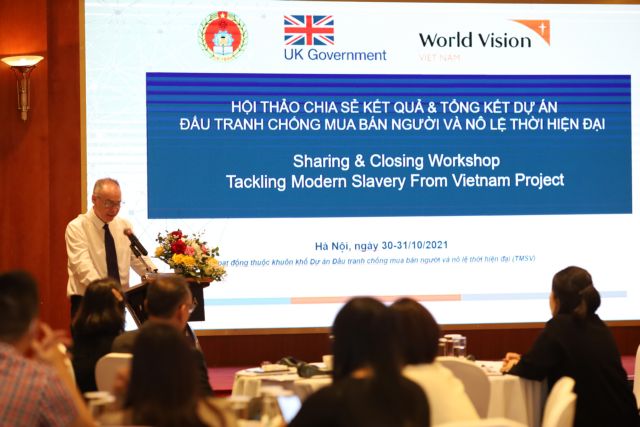 Society
Society


|
| Mark Holton, Second Secretary Migration and Immigration Liaison Manager, British Embassy in Việt Nam, delivers a speech at the workshop. — Photo courtesy of the World Vision Việt Nam |
HÀ NỘI — So far, 355 potential human trafficking victims from Việt Nam have been provided with health, education, legal, psychological, and livelihood support, thanks to an international project tackling modern slavery.
Based on targeted support methods built on an understanding of trauma and individual and community strengths, the project has achieved encouraging results. These include increasing capacity to more than 541 support staff at all levels; promoting policy advocacy in supporting human trafficking victims; and strengthening connections between domestic and international organisations with units that provide support services for Vietnamese migrants and those trafficked overseas.
The information was revealed at a workshop held by the World Vision Việt Nam in collaboration with the Departments of Labour, Invalids and Social Affairs of Hải Phòng, Quảng Ninh, Nghệ An, Hà Tĩnh, and Quảng Bình on October 30-31.
At the event, the participants looked back at the implementation of the project at central and local levels, including challenges, achievements, and lessons learned from multiple perspectives.
Mark Holton, Second Secretary Migration and Immigration Liaison Manager, British Embassy in Việt Nam, said “The project has brought together a wide range of agencies and sectors from central to local, joining hands in awareness-raising, community engagement, sustainable direct assistance, and capacity building for government and civil society partners at the national, provincial and commune level”.
"The open, logical and creative coordination among different actors is the reason for the project's successful implementation," said Bùi Văn Hưng, Deputy Director of Nghệ An Department of Labour, Invalids and Social Affairs.
"Although the project implementation was affected by natural disasters and the COVID-19 pandemic, it has actively contributed to the target groups' psychological well-being and change of mindset," said Lê Hồng Tình, Deputy Head of the Division of Labour, Invalids and Social Affairs of Nghi Xuân District, Hà Tĩnh Province.
“The confidence, understanding and broadening vision brought by the project is the key to removing confusion and ambiguity, thereby inspiring and motivating potential victims and victims of human trafficking to stay and build a life in their homeland,” added Pham Thi Nhung, Specialist of the Division of Children and Prevention of Social Evils in Hà Tĩnh Province.
In addition, within the framework of the third area of impact, World Vision Việt Nam also joined hands with World Vision UK and ECPAT (UK) to research and develop a database for Vietnamese migrants and/or residents in the UK. It includes valuable information about the rights of migrants in the UK and reputable agencies that can assist them when needed, including the National Hotline 111’s Zalo account.
Nguyễn Thu Hà, the project manager, said: “24 months are not lengthy, but in that time the project and partners have helped members of the target groups promote their strengths and walk confidently in their journey. This reduces the vulnerability and the risk of human trafficking and free migration.”
Being implemented from 2018 to 2021, the project, funded by the UK Home Office, is an interagency partnership initiative working with the Vietnamese Government and local actors to reduce individual and community vulnerabilities to modern slavery, including human trafficking.
Together with consortium partners, Vietnamese Government partners, and local community actors, the project aims to change behaviours and promote alternative livelihood opportunities, while strengthening access to the local justice system and victim services to maximise the impact of collective action in reducing vulnerabilities to modern slavery. — VNS




